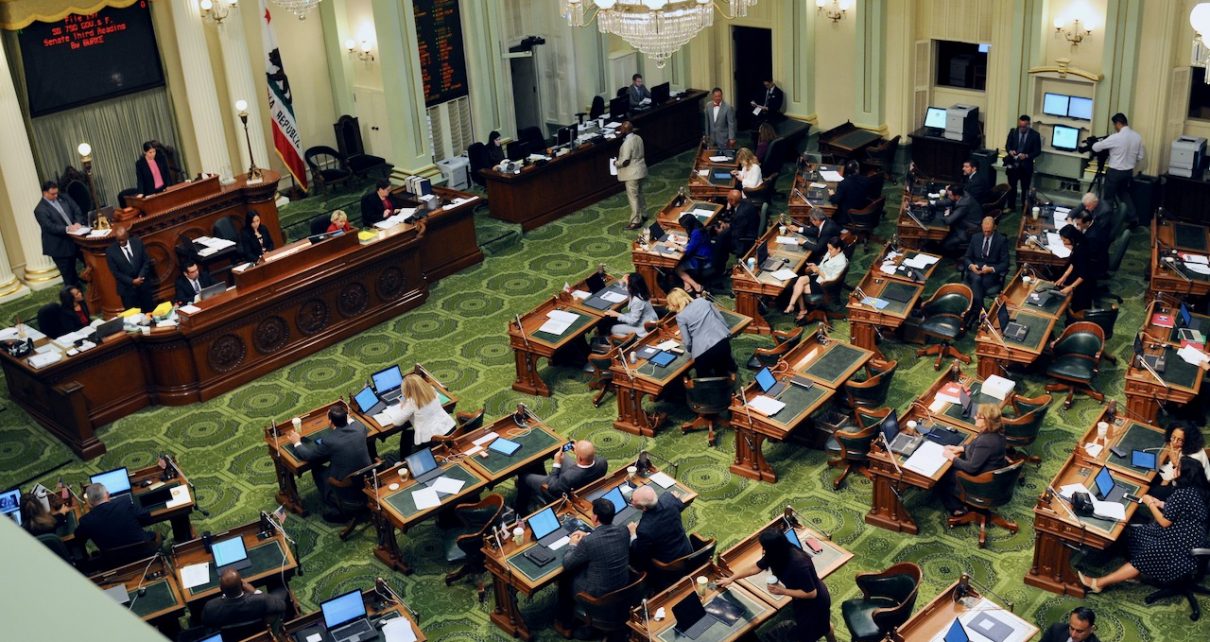
California State Assembly Chamber. (Photo: Kevin Sanders for California Globe)
Legislative Witnesses
If any witness neglects or refuses to obey a subpoena, or appearing, neglects or refuses to testify, he has committed a contempt
By Chris Micheli, October 17, 2024 2:10 pm
Chapter 4 deals with witnesses. Section 9400 defines the term “committee.” Section 9401 provides that a subpoena requiring the attendance of any witness before the Senate, Assembly, or a committee may be issued by the President of the Senate, Speaker of the Assembly, or the chairman of any committee before whom the attendance of the witness is desired if, so long as permission has been secured from the Rules Committee of the respective house.
Section 9402 specifies that a subpoena is sufficient if it states whether the proceeding is before the Senate, Assembly, or a committee; is addressed to the witness; requires the attendance of the witness at a time and place certain; and is signed by the President of the Senate, Speaker of the Assembly, or chairman of the committee before whom attendance of the witness is desired.
Section 9403 says that the service of a subpoena may be made by any person over 18 years of age. Section 9404 provides that the members of any committee may administer oaths to witnesses in any matter under examination. In addition, anyone authorized to administer oaths who is designated by the chairman of a committee may administer oaths to witnesses.
Section 9405 provides that, if any witness neglects or refuses to obey a subpoena, or appearing, neglects or refuses to testify, or to produce upon reasonable notice any material and proper books, papers or documents in his possession or under his control, he has committed a contempt.
Section 9406 says that, if the contempt is committed before the Senate or Assembly, the Senate or Assembly may commit him for contempt by resolution entered on the Senate or Assembly Journal.
Section 9407 specifies that, if the contempt is committed before a committee during the session of the Legislature, the committee is required to report the contempt to the Senate or Assembly, for action as may be deemed necessary by the Senate or Assembly.
Section 9408 states that, if the contempt is committed before a committee when the Legislature is not in session, the superior court in and for the county in which any inquiry, investigation, hearing or proceeding may be held by the committee may compel the attendance of the witness, the giving of testimony, and the production of books, papers, documents and accounts, as required by the subpoena issued by the committee, on the filing by the committee of a petition to the court asking that the witness be so compelled.
Section 9409 allows any witness neglecting or refusing to attend in obedience to a subpoena may be arrested by the Sergeant-at-Arms and brought before the Senate, Assembly or committee.
Section 9409.5 provides that no witness is privileged to refuse to testify to any fact, or to produce any paper, respecting which he or she can be examined by the Senate, Assembly, or a committee, upon the ground that the testimony to the fact or the production of the paper may tend to disgrace the witness or otherwise render the witness infamous.
Section 9410 states that, if a witness asserts his or her privilege against self-incrimination, and the person presiding over the proceeding directs the witness that, notwithstanding that assertion of privilege, he or she is required to answer the question or produce the documents or other materials, the witness may not refuse to testify or produce the documents or other materials on the basis of his or her privilege against self-incrimination.
Section 9411 requires every State department, office, board, commission or bureau to discharge any person who commits contempt before any committee. That person must receive no compensation from the State or any agency thereof for services rendered after the date of such refusal.
Section 9412 provides that every person who, being summoned to attend as witness before the Senate, Assembly, or any committee, refuses or neglects, without lawful excuse, to attend, wilfully refuses to be sworn, to answer any material and proper question, or to produce, upon reasonable notice, any material and proper books, papers, or documents in his possession or under his control is guilty of a misdemeanor.
Section 9414 makes it a misdemeanor for any person who coerces or attempts to coerce any person not to appear as a witness before any committee; or any employer or person acting on behalf of an employer who, directly or indirectly, harasses any person employed by that employer, when the harassment is motivated by the fact that the employee is, was, or may be a witness before a committee, is guilty of a misdemeanor.
- Renewal of Judgments - February 18, 2026
- Hearings on Third-party Claims - February 18, 2026
- Cullen Earthquake Act - February 17, 2026




